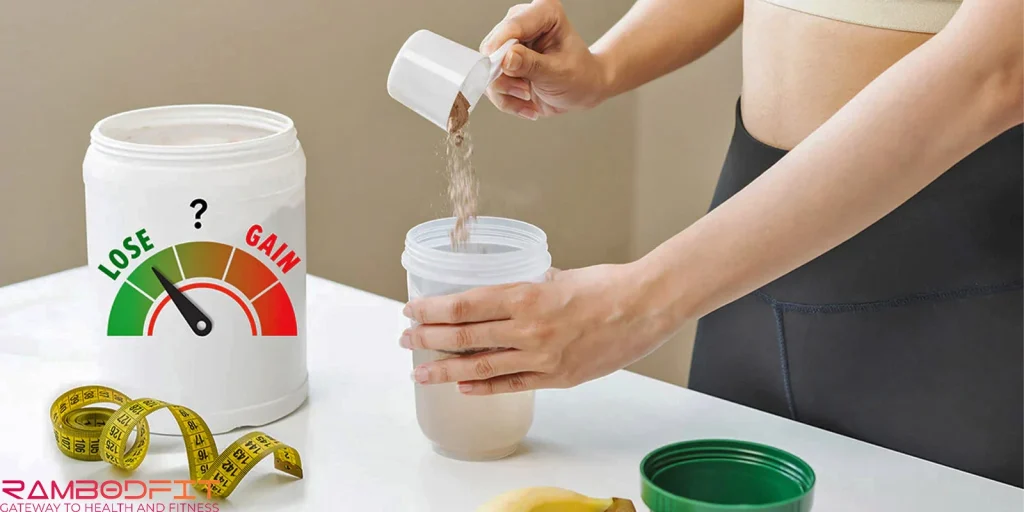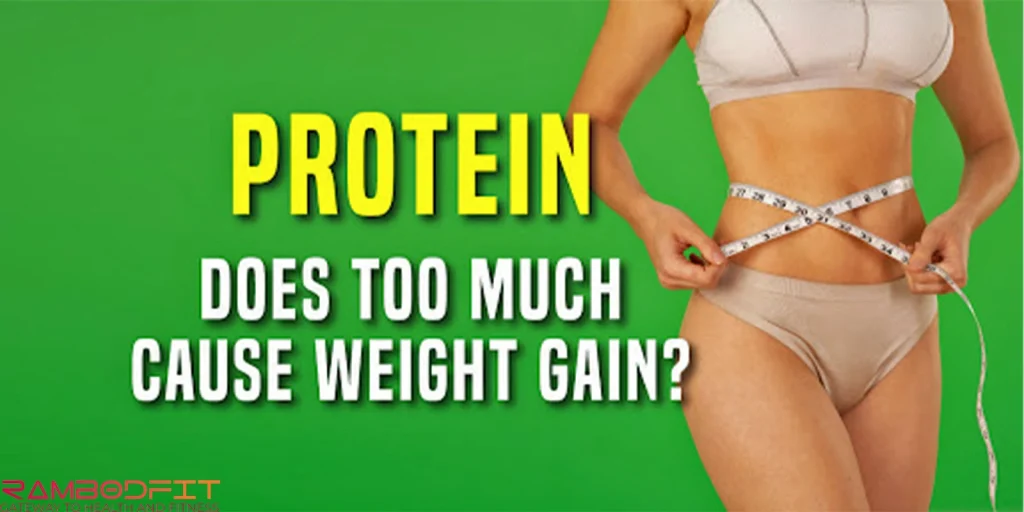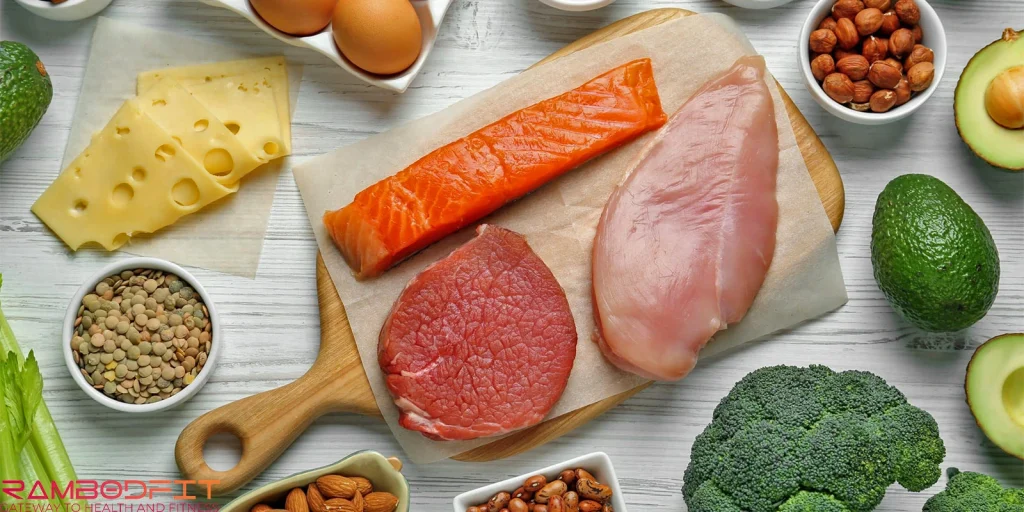


So, picture this: I’m fresh in the gym game, absolutely convinced that protein is basically magic. Like, if Zeus had a supplement line, it’d be nothing but tubs of whey. Suddenly I’m shoveling chicken breast into my mouth like I’m training for an eating contest, mainlining protein shakes, gnawing on Greek yogurt at 1 a.m. because, you know, #gains.
But then—bam. One night, I’m halfway through this so-called “healthy” protein bar, and I glance at the label. More calories than a slice of cake. Seriously? That’s when it hit me. Too much protein makes you fat!
Is pounding all this protein just gonna make me fat? Let’s cut through the influencer hype and get brutally honest. Rambodfit style: no fluff, just real talk about what happens when you go full protein maniac and see if too much protein makes you fat or not.
Table of Contents

Everybody in the fitness world acts like protein is the holy grail—muscle up, burn fat, recover faster, blah blah blah. It’s worshipped. But, yo, after your third shake of the day and some weird casein sludge before bed, don’t you ever stop and think: what actually happens if you’re blasting past your calorie limit with all this extra protein?
Here are 5 truths about the fact that too much protein makes you fat.
People act like protein only exists for gym bros and bodybuilders—like it’s just about flexing biceps and chugging shakes. But honestly? Protein’s kind of a big deal outside the squat rack.
Zoom in, and you’ll see protein’s basically made of amino acids (aka those “building blocks of life” your high school bio teacher wouldn’t stop talking about). But here’s the thing: they’re not only about making you swoon. Your body uses these little guys to crank out:
So, don’t box protein in as some gym rat’s secret weapon. It’s like the underappreciated mastermind keeping your whole system running, while everyone’s busy obsessing over biceps.
Personal insight: man, I totally went through this weird phase where I felt dead-tired all the time, even though I was inhaling chicken breasts like it was my job. Just stuffing yourself with protein isn’t the golden ticket—who knew? Too much protein makes you fat; that is for sure true.
I was skimping hard on carbs and fats, so my poor body tried to MacGyver those amino acids into everything: energy, hormones, fighting off whatever germs came my way. Muscle repair? Yeah, that got shoved to the bottom of the priority list. Not shockingly, I crashed and burned. Lesson learned: you can’t survive on protein shakes and wishful thinking.
Okay, here’s the real deal nobody mentions: calories? Yeah, they’re not all pulling their weight the same way. Too much protein makes you fat if it is a caloric surplus.
Protein’s the heavyweight champ when it comes to something called the Thermic Effect of Food—fancy name, but really, it just means your body has to hustle way harder to break down protein than carbs or fats. Like, your metabolism basically clocks in for overtime when you eat that chicken breast.
Check this out:
Fat: your body barely breaks a sweat—maybe 0 to 3% of the calories get burned.
Carbs: a little more effort, like 5 to 10%—think brisk walk.
But protein? We’re talking 20 to 30%. That’s a third of your steak’s calories just vanishing while your body does the hard work of digestion. Wild, right? So yeah, not all calories are created equal, no matter what the old-school diet books say.
Pro tip analogy: Imagine eating 3 chicken fillets. Your body might burn the energy from one entire fillet just to digest the other two.
This makes protein an inefficient fuel source—but metabolically, that’s a beautiful thing. It makes you fuller, helps regulate your metabolism, and minimizes fat storage—but only up to a point. However, too much protein makes you fat.
Alright, let’s just clear this up: yeah, your body *can* turn protein into fat, but honestly? It’s like Plan Z. Seriously, your body treats protein like royalty—it’ll bend over backwards to use it for literally anything else first.
Turning protein into fat or too much protein makes you fat? That’s called de novo lipogenesis (DNL), but don’t let the fancy name fool you. Doing this with protein is a total hassle for your system—super inefficient and kind of a metabolic pain in the butt.
Your body’s got way better ideas for protein, anyway. Stuff like:
So yeah, protein’s last stop is fat storage. It’s got a million jobs before your body even thinks about socking it away as love handles; however, too much protein makes you fat.
A 2008 study published on PubMed, overfed participants with excessive protein, without fat gain, surprisingly. Muscle mass increased, metabolic rate went up, and body composition improved—even when the protein intake exceeded their calorie needs.
Look, your body isn’t exactly eager to stash protein away as fat. It’ll burn through carbs and fats first, no question. Protein gets the side-eye—your system pretty much refuses to turn those precious amino acids into fat unless you’re, like, drowning in calories.
And even if you’re shoveling in food like it’s Thanksgiving every day, converting protein to fat is a real pain for your body. Super slow, burns a bunch of energy, and honestly, it’s the last thing your metabolism wants to bother with. So yeah, out of all the macros, protein’s the least likely to end up padding your waistline.

Alright, here’s where things get wild. Protein isn’t just hard to stash away as fat—it helps torch the stuff. Yeah, you read that right.
So, check this out:
🔥 Feel-Full Factor
Protein calls up leptin—the “yo, stop eating” hormone. Your brain gets the memo, cravings take a hike, and you’re not prowling the kitchen for snacks like some midnight raccoon.
🔥 Gut Vibes
Chow down on protein, and your gut pumps out heavy hitters like CCK and PYY. These guys tell your body, “We’re good, no more food needed.” Plus, there’s a little something called glutamine that keeps your gut lining happy. (Honestly, gut health is criminally underrated.)
Quick story: Had this client, a total night owl with a weakness for cookies after dark. We tossed in an extra 30g of protein at lunch—lentil soup and a scoop of Greek yogurt, nothing fancy. Like magic, her 10 PM cookie raids vanished. Didn’t even have to tell her to stop; she just wasn’t hungry. She ended up eating 400 fewer calories a day without even thinking about it.
🔥 Effortless Calorie Cut
Eat more protein, feel less hungry, snack less, drop calories. Boom—fat loss, no calculator or food scale required.
Oh, and there’s legit research (PMC’s got the receipts) showing that ramping up your protein hangs on to your muscle and melts more fat, even if you’re not sweating buckets at the gym. Science is on your side, my friend.
Alright, let’s cut the crap—calories are calories, even if they’re dressed up in “clean eating” drag. You can slap a “healthy” label on a protein cookie all day, but your waistline doesn’t care about branding. Too much protein makes you fat!
🚩 Sneaky High-Protein Junk
You know those protein bars, shakes, and all those snacky things that look like they belong in a gym rat’s lunchbox? Yeah, most of them are just candy bars with a marketing degree. Some “healthy” peanut butter protein bar? Bam—400, maybe 500 calories. Munch two of those on autopilot and, guess what? You’re in a calorie surplus faster than you can say “whey isolate.”
🚩 The Stack Pile-Up
Here’s where it gets wild: high-protein diets usually drag a posse with them—
So yeah, you’re getting your protein, but you’re also sneaking in a stack of calories you probably didn’t bargain for. Happens to the best of us.
Client experience:
Man, I had this one guy, always whining about “bulking too fast.” Dude’s daily fuel? We’re talking five—yeah, five—protein shakes, each one loaded up with oats, bananas, honey, almond butter, the whole nine yards. He was pounding back like 3,800 calories a day and telling himself it was all “clean bulking.”
Sorry, pal, but it’s not the protein turning you into a marshmallow—it’s guzzling down that calorie smoothie like it’s water. Too much protein makes you fat, alongside high calories.

Alright, let’s just get this out there—cramming down more protein isn’t some magic recipe for getting chubby. Your body doesn’t just toss an extra scoop of whey onto your belly and call it a day. That’s not how it works. Too much protein makes you fat.
Protein’s actually pretty badass. Helps you hang onto muscle, keeps your stomach from screaming at you an hour after you eat, even cranks up the ol’ calorie burn a bit. But hey, calories are still king. Chow down more than you burn, and yeah, your body’s gonna stash the extra—doesn’t matter if it’s from chicken, bread, or, I dunno, a stick of butter, eventually too much protein makes you fat.
So, before you start side-eyeing your grilled chicken like it’s out to get you, maybe take a look at what’s riding shotgun on your plate. Is it the protein, or, you know, maybe the mac and cheese mountain next to it?
Best Protein Timing For Muscle Growth: 4 Science Suggested For Natural Athletes
Nope. I wish. Protein’s a bit trickier for your body to turn into fat, sure, but c’mon—if you’re cramming in more calories than you burn, your body’s gonna stash the extra somewhere. Doesn’t matter if you got those cals from steak, shakes, or a mountain of tofu—eventually, your waistline’s gonna notice, and too much protein makes you fat.
Yeah, usually. Protein’s like the MVP here: it burns more calories during digestion, keeps you feeling full, and helps hang onto muscle (nobody wants to lose muscle, right?). That said, carbs aren’t the devil, especially if you’re active or hitting the gym. Just don’t go carb-crazy, and you’ll be fine. Balance, people. Still, too much protein makes you fat.
Honestly? Don’t stress over some magic “window.” Just spread your protein out through the day—think 20–30 grams every 3–4 hours or so. That keeps your muscles happy, keeps you from getting hungry, and yeah, helps with fat loss. Super complicated, I know. However, too much protein makes you fat.